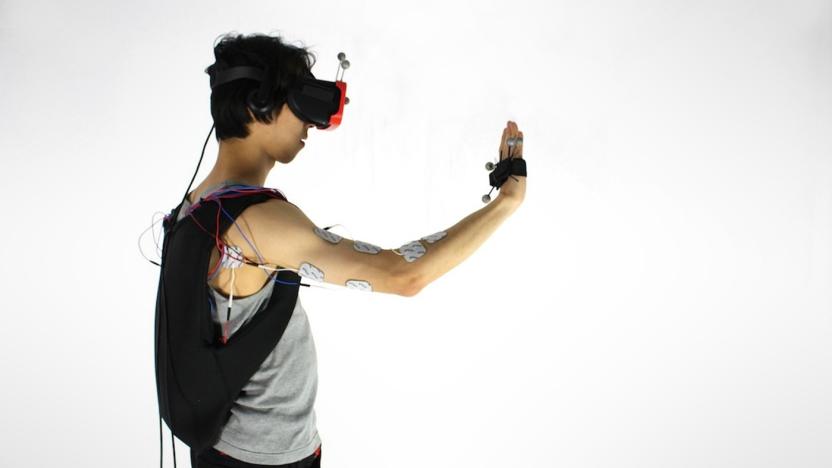ElectricShock
Latest

Researchers simulate walls in VR by shocking your muscles
Virtual reality is still a pretty crappy facsimile of The Matrix, but scientists are trying their best to fix that. At the CHI'17 conference in Denver, a team of researchers from the Hasso-Plattner-Institut in Potsdam showed off a haptic system that can simulate walls or heavy objects via electrical muscle stimulation. "We were really interested in trying to explore one of the hardest things to recreate in terms of physical sensation, which is a wall," says co-author Pedro Lopes.

The Shock Clock band uses fear and electricity to wake you up
How hard is it to get up in the morning? When you have a job -- and want to keep it -- most of us can usually haul our sleepy asses out from beneath the duvet, even if that's at the last minute. I'm not exactly Mr. Sunshine in the mornings, but is an electric shock really the answer? Pavlok, the team behind the Shock Clock band thinks so, and luckily enough for you, I hate myself just enough that I was willing to find out if it works. You know, for science and whatnot.

French hackers connect a shock collar to a Sega Genesis, let obscenities fly (video)
There are masochists, and then there are masochists. We'd have to put French hackers Dyak and Furrtek in the latter category. The two ingenious and self destructive modders tweaked the beloved Sega Genesis to send signals to a pair of controllers any time the player takes damage. That signal doesn't produce rumbles or blinking lights, however, it's passed through a port to a shock collar meant for dogs. That's right, every time you get hit, you get zapped. The jolt of electricity you receive is hardly deadly, but it's certainly not pleasant, as you can tell from the barrage of obscenities bleeped out of the above video. The hack isn't exactly easy but, if you're bold, and don't mind a bit of pain, you'll find full details of the mod at the source link.

MIT researchers locate genes that help underlie memory formation, zap some mice
Over time, the neurons in your brain are going to change. And that's only natural. When you experience a new event, your brain encodes the memory by altering the connections between neurons, which is caused by turning on several genes within these neurons. Recenty, a team of neuroscientists at MIT published their findings in the Dec. 23rd issue of Science in which the group was able to pinpoint some of the exact locations of memory formation within the brain. The team, led by Yingxi Lin, found that the Npas4 gene is especially active in the hippocampus, a brain structure known to be critical in forming long-term memories. Once engaged, the Npas4 gene turns on a series of other genes that modify the brain's internal wiring by adjusting the strength of synapses, or connections between neurons. The findings were obtained by studying the neural activity of mice which underwent mild electric shocks when they entered a specific chamber. Upon receiving the shock, researchers noted that Npas4 is turned on very early during this conditioning. The research is still in its early stages and while the researchers have identified only a few of the genes regulated by Npas4, they suspect there could be hundreds more that help with the memory formation process. The lesson learned: stick to it and if you have any questions, mildly shock some mice.

Mattel Mindflex hack shocks you into serenity
Okay, we're in love with this delightfully evil Mattel Mindflex hack, which delivers an electric shock if you don't remain calm, but we have to wonder: wouldn't this thing be amazing if you hooked it up in reverse and punished not thinking enough? Video after the break.

Researchers add fear of electric shock to "Pac-Man-like" game
Researchers at University College London look to have taken a slightly unconventional approach in their studies on fear, with the BBC reporting that they've crafted a "Pac-Man-like" game that boasts the added risk of electric shock. Apparently, volunteers play the game while an MRI scanner monitors them, moving a blue triangle through a 2D maze while trying to avoid a red dot "predator." If that dot catches them, they receive an electric shock. As that danger neared , the researchers found that players stopped using their their prefrontal cortex in their forebrain and instead relied on their midbrain area, which controls "gut-level reflexes." At least that's what they're saying. We have a sneaking suspicion it may all just be an elaborate trick the researchers play on freshman students.[Via The Inquirer]




